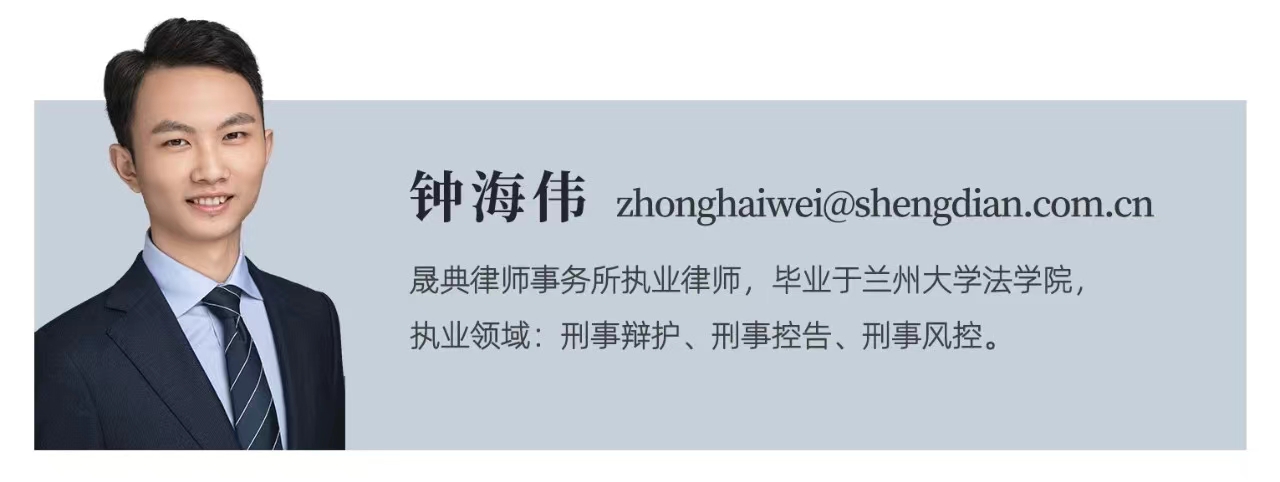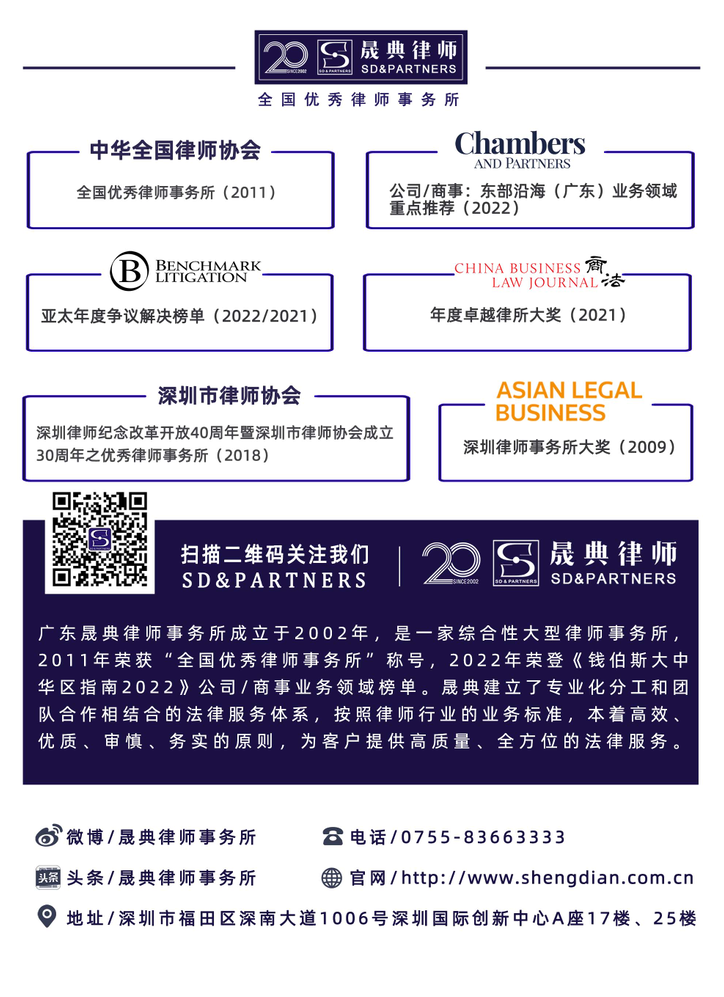Fund managers illegally do OTC options "punishment" not "punishment"
![]() Loading...
Loading...
![]() 2022.08.19
2022.08.19

Introduction
Recently, it was reported on the Internet that a number of public fund managers were taken away by the public security organs for investigation for illegal over-the-counter options. As soon as the relevant news was sent out, it quickly spread, bringing "over-the-counter options", a financial derivative tool that ordinary people are not familiar with, into the public's view, and at the same time pushing public fund managers who illegally do over-the-counter options to the forefront. At present, the official has not responded to the above news, and the details of the specific case have not been released. Therefore, on the basis of a brief explanation of the concept and characteristics of over-the-counter options, this paper analyzes the possible criminal offences of the fund manager in question according to the possible mode of operation of the fund manager in question.
一、What is an "over-the-counter option"?
二、“Why are over-the-counter options "favored" by fund managers "?
After understanding the basic concept of "over-the-counter options", it is necessary to understand why fund managers prefer to operate illegally through "over-the-counter options. In this paper, for fund managers who want to make illegal profits through illegal operations, over-the-counter options have the following three main advantages over the traditional way of borrowing other people's securities accounts to buy related securities directly.
(I) High leverage
As mentioned above, the royalty system makes over-the-counter options have their own leverage effect. Under the same capital conditions, fund managers can leverage several times or even dozens of times of assets by borrowing over-the-counter options. Therefore, fund managers who violate the rules can obtain greater illegal benefits through over-the-counter options. The specific principles have been mentioned above and will not be repeated here.
(II) Flexibility
Another advantage of OTC options is their flexibility. Unlike OTC options, the exercise price and time of OTC options can be "customized". For fund managers who have illegal intentions and want to use undisclosed information such as institutional investment decisions or insider information to make illegal profits, they can design option contract terms that are more likely to maximize profits based on the above information they have. For example, a public fund manager with illegal intentions can buy a stock in the future according to the decision time of the public fund he manages, targeted design of option contract expiration dates and exercise terms to maximize illegal benefits.
(III) Concealment
Since the purpose of the perpetrators of securities crimes or securities violations is to make profits, whether it is insider trading or trading using undisclosed information, or manipulating the securities market, their profits will ultimately be realized through securities trading. Therefore, for a long time Since then, the regulatory authorities have mainly investigated and dealt with securities crimes and securities violations by monitoring securities transactions. Correspondingly, for those who engage in illegal acts such as insider trading, their usual ways of evading supervision are mostly to control the securities accounts of relatives or other related persons to engage in related transactions, but this way of evading supervision is becoming more and more difficult to escape in the face of the increasingly powerful big data monitoring system of the regulatory authorities. No matter how many securities accounts the actor controls, no matter whether the relationship between the securities accounts controlled by the actor and the actor himself is obvious, any trading anomaly may be detected by the regulatory authorities.
Over-the-counter options, on the other hand, provide a very hidden channel for engaging in illegal securities trading. First of all, according to Article 3 of the notice on Further Strengthening the supervision of over-the-counter options business of securities companies issued by the CSRC in 2018, the counterparty of the over-the-counter options business of securities companies should be professional institutional investors in accordance with the measures for the management of the appropriateness of securities and futures investors, and a series of conditions should be met. Therefore, individual fund managers as natural persons are unable to directly conduct over-the-counter options trading, and fund managers with relevant illegal intentions can choose to conduct over-the-counter options trading with securities companies through private equity funds, asset management products and other channels, which will greatly increase the difficulty for regulators to verify the identity of real investors. In order to further evade supervision, fund managers with illegal intentions can even put on multiple layers of "vest" on the basis of the above path, such as using other natural or legal persons to invest in private equity funds or asset management products, or borrowing multiple private equity funds or asset management products in combination with other natural or legal persons to carry out repeated multi-layer nesting. Secondly, one of the characteristics of options is that they may not be actually delivered, that is, fund managers who make profits through over-the-counter options trading will not have actual securities transactions when trading options with securities companies, which also brings great difficulties to the big data monitoring system of securities regulatory authorities to accurately identify securities crimes and securities violations.
From the perspective of the above-mentioned concealment, OTC options can be said to be an "upgraded version" of illegal and criminal means developed by fund managers and other relevant practitioners in response to increasingly strict supervision.
三、What crimes may a fund manager be suspected of doing over-the-counter options?
After introducing the basic concept of "over-the-counter options" and analyzing why fund managers "favor" over-the-counter options, this paper attempts to analyze the criminal responsibility of fund managers to do over-the-counter options from a criminal point of view, in order to explain why the fund manager in the rumor was "taken away". In view of the extremely limited information currently disclosed through public channels, the following section will speculate on the possible behavior patterns of the fund manager and analyze the possible criminal offences he may be suspected of, based on his possible motives and profit logic for making over-the-counter options.
(I) Crime of Trading with Undisclosed Information
The fourth paragraph of Article 180 of my country's "Criminal Law" stipulates the crime of using undisclosed information to trade, which is the so-called "rat warehouse". Rat warehouse is essentially a kind of breach of trust. Fund managers and other financial practitioners, as professionals in financial management on behalf of clients, should have worked diligently and served the interests of clients. However, in the case of rat warehouse, the relevant financial practitioners used other people's funds to make profits for themselves. The traditional rat position in the securities market is manifested in the form of: the actor because of the convenience of the position to obtain the institution's investment decision, such as the institution will buy a stock and other undisclosed information, before the institution to buy a stock, in the institutional funds to raise the stock price and then before the institution to sell the stock profit.
Combined with the online information, we believe that the possible mode of operation of the fund manager involved in the case is: the public fund manager involved in the case obtained during his tenure of the public fund will invest in a stock and other undisclosed information that may affect the price of the stock, and foresees that the price of the stock will rise significantly in the future. In order to obtain illegal benefits and evade supervision, the fund manager bought the stock option in advance in a securities company through a private equity fund and other channels. Later, due to the large-scale purchase of the public fund, the price of the stock indeed rose significantly, the fund manager on the agreed exercise date to the securities company to buy the stock at an agreed relatively low price, or not actually delivered, by the securities company to pay the difference, to obtain a huge income.
As can be seen, the above model and the traditional rat warehouse in essence is not much different, are fund managers according to their own grasp of undisclosed information, ahead of the institution before the opening of positions or buy individual stock options, to be institutional funds to lift the stock price and then close the position or exercise the right to buy stocks. From the perspective of legal application, regardless of whether the actor actually delivers the OTC options after purchasing them, this paper holds that the use of OTC options to implement rat positions is also in line with the provisions of the fourth paragraph of Article 180 of the Criminal Law of our country that "engage in securities trading activities related to the information, or express or imply that others engage in relevant trading activities". There is no obvious legal obstacle to interpreting individual stock options trading as "securities trading activities. We believe that the criminal punishment for this kind of rat warehouse may mainly be the problem of evidence collection and fact determination, because our country's judicial practice generally adopts the theory of "convergent transaction" when determining the related party transaction in the case of trading with undisclosed information, that is, as long as the related party accounts are highly convergent in the varieties and trading time of securities traded in a specific period of time (generally "the first five and the last two" in practice), the relevant account may be identified as using undisclosed information to engage in related transactions. However, as mentioned above, unlike traditional rat positions, in the case of using over-the-counter options, there may be no buying and selling of securities at all. Even if there are buying and selling of related securities, the trading time point is very likely. It will not converge with the account transactions of relevant institutions. Therefore, the regulatory authorities may face greater difficulties in checking "convergent transactions.
(II) Crime of insider trading
The securities market should be an open and fair market. All investors should have equal status and fair opportunities to obtain market information. If someone obtains important market information before ordinary investors based on their position or other opportunities. For personal gain, the fair environment of the securities market will undoubtedly be seriously damaged. This is exactly the legislative intent of the crime of insider trading stipulated in Article 180 of the Criminal Law of our country.
In the case of the fund manager who does over-the-counter options discussed in this paper, if he or she obtains inside information that may have a significant impact on the price of a stock in the course of his or her interactions with executives of listed companies, employees of stock exchanges, securities companies, etc., such as a listed company will decide to make a major acquisition. Assuming that the fund manager believes that the public acquisition plan will have a significant positive impact on the shares of the listed company, he will buy the stock option from a securities company before the announcement of the acquisition plan, and exercise the right to buy the underlying shares from the securities company after the announcement of the acquisition plan, which does not rule out the possibility that the fund manager involved in the case is suspected of insider trading.
In similar circumstances in the above-mentioned cases, there should be no doubt that the fund manager involved is a person who illegally obtains inside information on securities as stipulated in Article 180 of the Criminal Law of China. What may be problematic in determining whether the relevant act constitutes the crime of insider trading is whether stock option trading can be identified as "buying or selling the securities" as stipulated in Article 180 of the Criminal Law. Specifically, if the expiration date of the individual stock option purchased by the fund manager involved in the case is within the sensitive period of insider information, that is, before the disclosure of insider information, and the fund manager also has the right to actually buy the underlying stock according to the agreement on the expiration date or expiration date, the behavior conforms to the provisions of Article 180 of the Criminal Law of China that "...... buys or sells the securities before the information that has a significant impact on the trading price of securities and futures has not been disclosed", where other conditions are met, it shall constitute the crime of insider trading.
However, if the expiration date of the individual stock option contract between the fund manager and the securities company is later than the time when the insider information is disclosed, and the actual exercise date is also after the insider information is disclosed, or the exercise date of the option purchased by the fund manager Although the date is within the sensitive period of insider information, the underlying stock is not actually delivered, but the securities company directly pays the difference to it based on the market value of the stock on the exercise date. In the above two cases, it is doubtful whether the fund manager can be determined to "buy or sell the securities" during the sensitive period of inside information, that is, in this case, it can be determined that only the actor conducted a stock option transaction during the sensitive period of inside information, and whether the stock option transaction can be determined as "buying or selling the securities" as stipulated in Article 180 of the Criminal Law? The answer is not obvious. However, in terms of the legislative intent of insider trading and the social harmfulness of the behavior, even if the fund manager exercise the right after the insider information is disclosed, generally speaking, he can buy stocks whose prices have risen significantly at a lower price based on option contracts. Profit, the social harmfulness of this behavior may not be less than ordinary insider trading behavior. In view of the purpose and length of this article, this issue will not be discussed here.
Therefore, this paper holds that under the condition that fund managers engage in over-the-counter option trading after obtaining inside information, if they exercise their rights during the sensitive period of inside information and actually make stock delivery, their behavior may be suspected of insider trading crime. However, if the exercise date is after the disclosure of inside information, or the exercise date is within the sensitive period of inside information, but the underlying stock is not actually delivered, whether this case constitutes insider trading is debatable. At the same time, it should be noted that under the above-mentioned insider trading behavior mode, the suspected crime of the fund manager involved in the case has little to do with his position, and ordinary subjects may also conduct insider trading through the above-mentioned methods.
(III) The crime of manipulating the securities market
Article 182 of China's Criminal Law provides for six modes of behavior in manipulating the securities market, plus two additional modes of behavior in the 2019 "Two Highs" Interpretation on Several Issues Concerning the Application of Law in Handling Criminal Cases of Manipulation of Securities and Futures Markets, one of eight modes of behavior in manipulating the securities market. According to the information transmitted online and in combination with the post characteristics of the public fund manager, we believe that the fund manager involved is relatively likely to be suspected of "continuous trading manipulation" as stipulated in item (I) of article 182 of the criminal law, that is, "alone or in collusion, concentrating capital advantages, holding shares or holding positions advantages or using information advantages to jointly or continuously trade". Therefore, only the following discussion of whether the online fund manager is in line with the continuous trading manipulation of this form of manipulation of the securities market, the remaining seven will not be discussed. Continuous trading manipulation is essentially the actor through continuous buying and selling of the way to affect the trading volume of the relevant securities, the formation of the securities trading active, favorable prospects of the illusion, to induce other investors to enter, and thus raise the price of securities, and finally sell securities for profit.
For example, if the online fund manager has already purchased a stock option, in order to raise the price of the underlying stock, with their own management of public funds to buy the stock, continuous trading, while attracting other investors to follow the investment, in order to raise the price of the stock after the exercise of profit. In this case, this paper holds that if the fund manager's behavior also meets the criteria for filing and prosecution stipulated in Article 34 of the (II) of the Supreme People's Procuratorate and the Ministry of Public Security on the criteria for filing and prosecution of criminal cases under the jurisdiction of public security organs, his behavior may be suspected of manipulating the securities market.
However, from a practical point of view, we believe that it is unlikely that public fund managers will manipulate the securities market in the above cases in practice. Because public funds generally have a more standardized decision-making management mechanism, it is difficult for fund managers to personally decide to buy or sell a particular stock at will, continuous trading manipulation mode of continuous trading, joint trading and other means of actual realization is extremely difficult, and very easy to be found. Therefore, for public fund managers, the more ideal way of arbitrage is actually to operate the fund normally according to the regulations, take a ride on the investment of their own institutions, and use their own decision-making information to buy over-the-counter options for profit, that is, the upgraded version of the "rat warehouse" model mentioned above. Under the condition that the public fund manager manages and operates the fund normally according to the regulations, even if the investment behavior of the public fund he works for does affect the stock price, this is also the impact of his normal business behavior on the securities market. it is also difficult to determine that he has subjective intention to manipulate the securities market, and it is even more difficult to identify such behavior as manipulating the securities market.
Conclusion
Although the official has not given the investigation results on the online fund manager's over-the-counter options, as analyzed above, there is a huge criminal risk for fund managers to make over-the-counter options, which may constitute a crime if the relevant conditions are met. Specifically, if the relevant fund manager is put on file for investigation by the public security organ, it is more likely to be suspected of using undisclosed information to trade. The storm of this incident has not yet subsided, and the specific results have yet to be officially announced, but it is certain that over-the-counter options, an uncommon financial derivatives instrument, has been brought into the public eye, regardless of whether the online transmission incident is true or not. Fund managers use over-the-counter options for illegal profits, a previously little-known illegal channel, is likely to usher in a new round of strong supervision.



